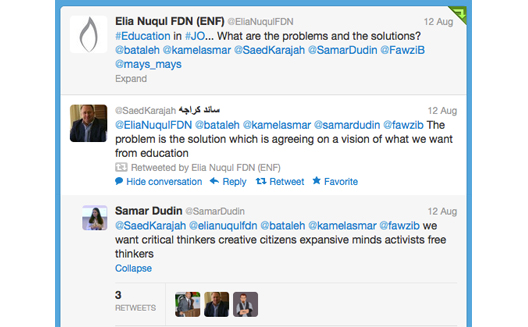Is Social Media important for Social Good in Arabia? 5 Examples from Jordan

It’s been three years since we launched Nakhweh (@nakhweh) to match volunteers in Jordan with local opportunities. As it evolved into what it is now, one of the most complicated struggles we’ve gone through has been trying to bring NGOs online to post their volunteering opportunities on our site. To do so, we started urging them to highlight their work and offer an alternative narrative in light of the general violence and strife in the media climate lately.
Now, three years later, it’s a different story; Jordanian nonprofits have begun welcoming the virtual world and some role models have even become leading examples of how social media can be used for social good.
With the impressive number of social activists and social entrepreneurs cropping up all over the region, social media has became critical for spreading the word about your business, building partnerships, and rallying different kinds of support and advocate for different causes. It's actually becoming one of the very first steps in kicking off a social initiative.

In Jordan, a few NGOs stand out as excellent examples of how to use social media effectively:
- The Jordan River Foundation
(JRF) uses social media to engage their beneficiaries, in
addition to spreading awareness about their work focusing on child
safety and community empowerment. On their social media channel,
they concentrate on youth issues, since their programs focus on
community development and child safety. JRF has also used social
media to promote their showroom and highlight their handicrafts
created by women. Social media is also very important for their
advocacy, especially when they are working on child safety, as they
work to reveal facts and numbers that are not well exposed in
Jordan and the region. WIth more than 6100 followers on Twitter,
they are also supported by tweets from @QueenRania.
- The Elia
Nuqul Foundation (ENF; @EliaNuqulFDN)
has created a large impact despite its small size, having educated
over 150 underprivileged students in Jordanian universities over
the past couple of years. The philanthropic organization,
which focuses on social and economic development initiatives, has
taken spreading awareness to a new level, making it easier for
their small organization to keep in touch with their beneficiaries
by creating a closed group on Facebook. Having a private group has
been especially important for allowing youths’ voices to be heard
in a protecteed environment. The organization has also advocated
for better education in Jordan by opening conversations online and
collecting data about student and youth perspectives on the
subject.
- Ruwwad
(@RuwwadJO), a
non-profit community empowerment organization that helps
disadvantaged communities overcome marginalization, uses social
media as a public communication channel with their youth where they
open online conversations about given topics. My favorite is one
that takes place on Saturday, Dardashat, a weekly cultural
discussion platform where youth can safely discuss books, cinema,
and matters related to their lives, with variety of speakers and
policy makers. Ruwwad also highlights the work they do in Jabal Al
Natheef which has exceptional impact; many people get curious and
visit the area simply because of what the organization publishes on
social media.
- INJAZ
(@INJAZorg) For INJAZ,
which brings capacity building programs to public schools and
universities, social media has become the best way to stay in touch
with their volunteers and beneficiaries, especially because their
target audience is on Facebook. Students keep the buzz going on
INJAZ's Facebook page and the organizations continues to engage
their audience by posting photos from events. They also use
Facebook and Twitter to spread awareness about their ongoing
volunteering program, promote their university courses, and engage
potential volunteers.
- Under My Olive Tree (UMOT; @UMOTorg), a nonprofit that promotes social activism, volunteering and sustainable projects in less privileged areas in Jordan, relays on social media as the primary tool to spread the word about different causes that need financial support throughout the Arab World. UMOT follows up on causes and posts their current news, which also helps the initiative raise more funds for these causes as well.
It’s evident from these examples that social media is not simply an alternative for NGOs, initiatives and social entrepreneurs anymore; it's the most inclusive and affordable way to reach out to beneficiaries, supporters and partners.
Now the biggest question is: how far are we from actually fundraising online? This issue is related to general fundraising dilemmas for startups in the region and especially in Jordan, and it’s complicated as well; current law doesn't allow foreign money to get to Jordanian NGOs easily. Yet at Nakhweh, in Jordan, we have noticed that, while offline fundraising works well, many donors have requested an online channel for donation. Hopefully, as organizations like Under My Olive Tree take online donation regional, we’ll see social media becoming a platform for fundraising.


